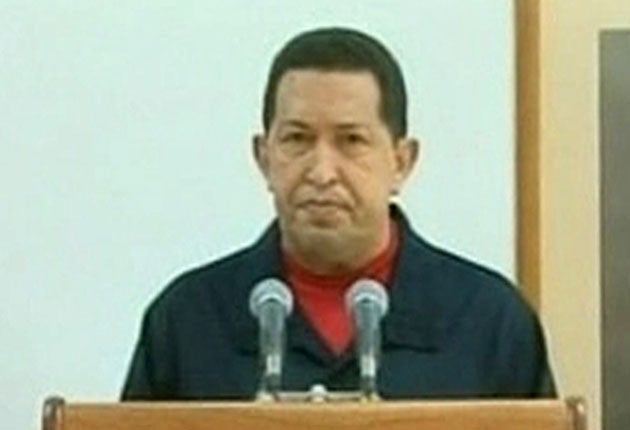Venezuelans told to stay calm after Chavez's cancer treatment

Your support helps us to tell the story
From reproductive rights to climate change to Big Tech, The Independent is on the ground when the story is developing. Whether it's investigating the financials of Elon Musk's pro-Trump PAC or producing our latest documentary, 'The A Word', which shines a light on the American women fighting for reproductive rights, we know how important it is to parse out the facts from the messaging.
At such a critical moment in US history, we need reporters on the ground. Your donation allows us to keep sending journalists to speak to both sides of the story.
The Independent is trusted by Americans across the entire political spectrum. And unlike many other quality news outlets, we choose not to lock Americans out of our reporting and analysis with paywalls. We believe quality journalism should be available to everyone, paid for by those who can afford it.
Your support makes all the difference.Venezuela was on the brink of political chaos last night after President Hugo Chavez admitted in a televised address that he has cancer.
Looking slim and subdued, Mr Chavez, who has been treated in Cuba for the past three weeks, made the announcement after his recent uncharacteristically low profile prompted fevered speculation about the presidential succession.
The speech, concise by Mr Chavez's standards at just 14 minutes, ended on an unusual note. Instead of signing off with his trademark "Socialist homeland or death", the President concluded: "We will live and conquer for now and forever."
Mr Chavez originally travelled to Cuba for treatment on an abscess on his pelvis. During the procedure, the President said, cancerous cells were found and he then underwent a second operation to have them removed. He will remain indefinitely in Cuba for treatment.
The news rocked Venezuela, where Mr Chavez has ruled for 13 years and towers over the political landscape. During that time, he has survived a coup, redrawn the constitution, frequently legislated by decree, and marginalised many of his opponents, both from the right and left. His dominance is so great that there is no obvious successor within his United Socialist Party of Venezuela.
Mr Chavez's supporters quickly moved to head off suggestions of a power vacuum. The head of the armed forces, Henry Rangel Silva, said: "He is recovering satisfactorily. We see our commander with a few kilos less but on his feet. The reality is that he is recovering. He is fine."
Vice President Elias Jaua appeared on TV with the entire cabinet to plead for calm. "We call on all the public authorities to unite in order to continue advancing the consolidation of the state." Mr Jaua also urged Chavez sympathisers to take to the streets to show their support, a call which was immediately heeded by hundreds in Caracas chanting "My commander" and wishing the President a speedy recovery. But not everyone was convinced, particularly in Venezuela's business community, which is highly hostile to the President.
Venezuela's economy is in serious trouble. Critics accuse the President of mismanaging Venezuela's oil wealth, wasting billions of petrodollars on grandiose projects. And inflation is about 30 per cent after the government was forced to devalue the currency by 50 per cent this year.
Although Mr Chavez remains wildly popular among poor Venezuelans, he appears electorally vulnerable for the first time. His approval ratings now hover in the low 40s, almost 10 points behind Henrique Capriles, the youthful governor of the province of Miranda, and a likely challenger in next year's presidential elections.
Join our commenting forum
Join thought-provoking conversations, follow other Independent readers and see their replies
Comments